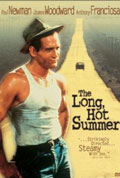
USA 1958
Directed by
Martin Ritt
1958 minutes
Rated PG
Reviewed by
Bernard Hemingway

The Long Hot Summer
A compelling Paul Newman in his first major screen role, one that epitomizes the alpha male screen image to this day, plays Ben Quick, an itinerant worker down Mississippi way who stumbles into the hot-bed of neuroses that is the Varner family who effectively own the backwater town of Frenchman's Bend, Mississippi.
Set, as the title indicates, during one long hot summer, all the typical elements of The Southern Melodrama are present - besides Newman’s stud are the crass, overbearing patriarch (Orson Welles), his cowed son (Anthony Franciosa) and his flirtatious, but childless, wife (Lee Remick) along with the principled, intelligent (read sexually-frustrated) daughter (Joanne Woodward). Woven into the relationships are the usual thematic preoccupations - the decaying gentry vs. the nouveau riche vulgarians and their variously frustrated lives a central concern being the tortured father-son relationship (a double whammy in this case ) - all of which will come together in a typical tale of the clash between repressive social conventions and rampant libidinal energy
Paul Newman and Joanne Woodward in their first film together are electric (they would marry in real life) although Woodward at 28 is a tad too old to play 23 whilst the Adonis-like Newman exposes more flesh than she in the first of many similar roles for him. On the other hand Welles is badly made-up, looking at times like an aubergine with a dusty wig on as he thunders and blusters away as the Big Daddy figure (compare Burl Ives in Cat On A Hot Tin Roof, also released the same year and Ed Begley in Sweet Bird of Youth. 1962).
The twangin' Southern accents gets a bit wearing with even Angela Lansbury going hell-for-leather whilst Ritt gives proceedings a rather literary and stagy feel (it was based on a series of short stories by William Faulkner). Probably the weakest aspect, however, is that the ending is far too glib to fit the mood of what has gone before (one can't help but ask how ol' man Varner is going to realize his ambition of having his name perpetuated by marrying off his daughter to Quick particularly as there is a suggestion that the latter might change his name but that is scotched). The overall result is formulaic but the Newman-Woodward pairing makes the film worth watching.
Want something different?





